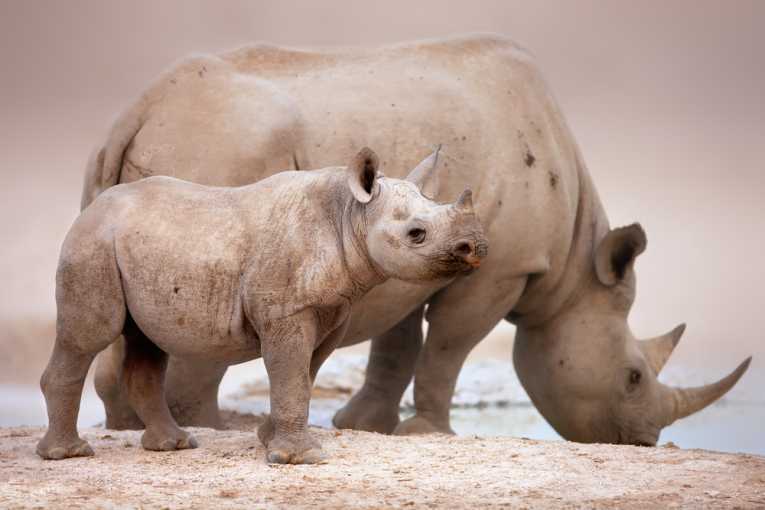2011 is the year that the rhino, and its friends, will never want to see repeated again; twelve months that have witnessed a bloody new chapter being carved out, in the story of the decline of this fearsomely magnificent animal. Rhino's have been air-lifted out of those reserves at most risk of poaching; they have had their horns sawed off, to prevent poachers targeting them; the South African army has been thrown into the fray in the Kruger National Park. All to no avail. This last year has seen a record number of poaching related deaths - approaching 460 - in South Africa alone, home to two-thirds of the world's dwindling rhino population.
That compares to 333 deaths in 2010 and just 13 back in 2007. It was also announced in November that the western black rhino is now extinct in Africa. And the toll from poaching is not confined to the dusty African veld. The Javan rhino was declared extinct in the jungles of Vietnam this year, with the last known animal found dead in October - its horn apparently hacked off by poachers. And the motive for all this slaughter? The myth of the horn's healing properties, which has swelled its value to astronomical heights - worth more by weight than gold, cocaine or platinum.
With rhino horn from the most endangered species - the black rhino - hitting more than $60,000 per kilo, sophisticated and ruthless criminal gangs have been drawn into a brutally profitable enterprise. The claims that rhino horn is a cure-all - for everything from cancer to AIDS to SARS -has taken deadly sway amongst much of the traditional Chinese medicine (TCM) community. The World Wildlife Fund suggests that up to 60% of TCM practitioners still stock rhino horn. That's despite TCM bodies in the UK and US slamming the myth of rhino horn's medicinal value.
And while China officially maintains its ban on the use of rhino horn in TCM, the importance of its homespun health industry - and the money to be made from rhino horn - seems to be leading to gruesome new twist to the tale. TIME magazine has revealed that China has imported over 100 rhinos from South Africa. These are being held in concrete pens, to provide for 'pharmaceutical raw materials' for a Chinese TCM company. So it seems that rhino farms are to join the tiger 'bone wine' farms and bear-bile milking factories, in the depressing annals of man's exploitation of animals.

Dehorned Rhino; Credit: Credit LJ Campbell - Chishakwe Ranch
This desperate year for the rhino has led to some taking desperate measures. A rhino reserve owner in South Africa, Damian Vergnaud, has taken to 'poisoning' the horns of his rhinos, to deter poachers. As well as being injected with barium, which has a nauseating taste that causes vomiting and diarrhea if swallowed, two dyes are added to the mix. One stains the horn, making it unusable for ornamentation. The other is extremely visible under x-rays - making it much more difficult to smuggle the dyed horn through customs. He is hoping the deterrence value will be as effective as dehorning the rhinos - but without the trauma and expense.
At the other end of the scale, some in South Africa are pushing for a market-based solution to the horror of horn-poaching - by re-legalizing the trade in horn. It is already legal to hunt for rhinos under license, in South Africa - although such hunts are becoming increasingly controversial, as rhino numbers head down. But to turn rhino reserve owners into wholesale rhino harvesters risks boosting the market for a medicine, one which is known to be useless. And some, like the WWF, have heavily criticized this proposal; there is no guarantee that rhino numbers will be protected, or that the illegal trade will be halted.
Whatever 2012 has in store for the future of the rhino, it is obvious that a solution of one sort or another will have to be found fast. Otherwise, in a few short years, the reality of another iconic species pushed into extinction will present itself - as the ultimate and final solution.










